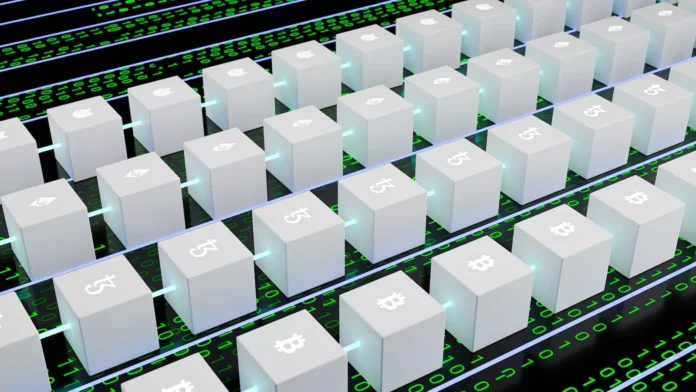What Is A Blockchain?
A blockchain is a digital and public ledger system that records and stores data in a secure and transparent manner. It is a distributed database that is managed by computers belonging to a peer-to-peer (P2P) network. Each block in the chain contains a cryptographic hash of the previous block, a timestamp, and transaction data. Blockchain technology was first used for the creation of Bitcoin, but it is now being used for other purposes as well. It is a secure, transparent, and immutable way to store and share data, making it an attractive option for businesses.
What Is A Blockchain?
What is a Blockchain and How Does it Work?
A blockchain is an immutable digital ledger that records transactions across a peer-to-peer network. It works by storing transaction data in blocks of information which are linked together in a linear chain. Each block contains a timestamp, a cryptographic hash of the previous block, and the data of the transaction. As each block is added to the chain, it becomes a permanent record that is secure and immutable. The peer-to-peer network works by verifying transactions on the blockchain.
Whenever a transaction is made, the network verifies its validity and then propagates the information to the other nodes in the network. All the nodes in the network need to agree that the transaction is valid before it is added to the chain. This consensus mechanism ensures the security of the blockchain and prevents fraud and data manipulation.
In addition to the peer-to-peer network, a blockchain also uses cryptography to protect its data. All the blocks in a blockchain are encrypted using cryptographic algorithms which make them nearly impossible to alter or delete. This provides an extra layer of security for the blockchain and helps ensure its integrity.
The advantages of a blockchain include its transparency, trustworthiness, and immutability. Since all the transactions are recorded on the public ledger, anyone can view them and verify their accuracy. This helps to reduce fraud and ensure that the data is accurate and up to date. Additionally, because the data is secured using cryptography, it is nearly impossible to manipulate or delete.
Overall, a blockchain is a secure digital ledger that allows for the secure transfer of data between peers. It uses a peer-to-peer network and cryptography to ensure the integrity of the data and to prevent fraud and data manipulation. This makes it an invaluable tool in the digital age.
How Blockchain Technology is Transforming the World.
As the world continues to become more interconnected, the need for secure, transparent systems of communication has never been greater. Blockchain technology is emerging as a revolutionary new way to store and transfer data, offering unparalleled security and traceability.
This revolutionary system is being adopted by a wide range of industries, from banking and finance to healthcare and logistics, and is transforming the way we do business. At its most basic level, blockchain technology is a decentralized database that stores information in a series of blocks, which are linked together in a chain. Each block contains a timestamp and a link to the previous block, creating an immutable record of all the transactions.
This distributed ledger is maintained by a network of computers, known as nodes, and is secured by advanced cryptography. The most significant benefit of blockchain technology is its unparalleled security. The decentralized nature of the system makes it almost impossible to tamper with the data, as any changes would have to be approved by the entire network. This makes it an ideal solution for storing sensitive information, such as financial transactions or medical records. In addition, the encryption techniques used in blockchain systems provide an additional layer of protection, ensuring that only authorized users can access the data.
The immutability of blockchain technology also makes it ideal for tracking and verifying the authenticity of goods. Major industries, such as retail and pharmaceuticals, are now using blockchain to trace the origin of products and ensure that they are not counterfeit. This traceability can also be used to monitor the supply chain, allowing companies to quickly identify and address any issues, such as contamination or product recalls. In addition, the distributed nature of blockchain technology makes it ideal for smart contracts.
These are automatic agreements that are executed when certain conditions are met, such as the completion of a payment or the delivery of a product. This removes the need for a third-party intermediary and streamlines the entire process, saving time and money. Blockchain technology is changing the way we do business, offering unparalleled security and traceability. From retail and finance to healthcare and logistics, this revolutionary system is transforming the world and revolutionizing the way we communicate, interact, and transact with each other.
Exploring the Advantages of Blockchain Technology.
In recent years, blockchain technology has taken the world by storm as a revolutionary new way to securely store and transfer data. With its promise of providing unparalleled levels of transparency, security, and decentralization, blockchain technology is quickly gaining traction among businesses and governments as a viable form of data management.
At its core, blockchain is a distributed ledger system that records data across a network of computers rather than a central location. This allows data to be shared, but not modified or tampered with. This secure data transfer is enabled by a series of cryptographic algorithms and protocols, which ensure that all data is stored in a single, immutable ledger. The main advantage of blockchain technology is its ability to provide a high degree of trust between parties without the need for a centralized authority. This allows for a secure and transparent system of data transfer and storage.
Blockchain technology also offers greater efficiency, as it eliminates the need for third-party intermediaries and allows for faster and more secure transactions. Another key benefit of blockchain technology is its ability to reduce costs. As transactions are securely stored and tracked on a distributed ledger, there is no need for multiple parties to verify transactions, which can reduce overhead costs. Furthermore, blockchain technology can reduce the cost of auditing and compliance, as it can provide a “single source of truth” for transactions.
Finally, blockchain technology is also well-suited for applications such as smart contracts. Smart contracts are computer programs that can execute tasks and enforce agreements automatically. This can reduce the need for manual intervention, as well as eliminate the risk of fraud or human error. In short, blockchain technology offers numerous advantages over traditional data management and transaction processing systems. By offering increased security, transparency, and cost-effectiveness, blockchain technology is quickly becoming the preferred choice for businesses and governments alike. As this revolutionary technology continues to advance, it is certain to bring about radical changes to the way we store and transfer data.
Real-World Use Cases of Blockchain.
Blockchain technology is quickly becoming one of the most widely discussed topics in the business world. It has been heralded as a revolutionary technology capable of transforming the way we store, exchange, and track information. While its potential uses are far-reaching, there are already a number of practical applications of blockchain technology in the real world. One of the most widely adopted use cases of blockchain technology is in the financial sector.
Banks and other financial institutions are using blockchain to provide more secure and reliable methods of transferring money, as well as to facilitate the trading of stocks and other assets. Blockchain also offers greater transparency and more efficient record-keeping, making it easier for these institutions to manage their finances. The healthcare industry is also beginning to embrace blockchain technology. By securely storing patient data on a distributed ledger, healthcare providers can ensure that the information is secure and accessible only to those who need it. Blockchain also makes it easier to track the history of medical treatments and prescriptions, which can help reduce the risk of medical errors. Another important use case of blockchain is in the supply chain industry.
Companies are using blockchain to track and monitor the movement of goods throughout the supply chain, from manufacturing to delivery. This allows companies to better manage their operations, improve efficiency, and reduce the risk of fraud. Finally, blockchain technology is also being used to create new digital currencies, such as Bitcoin and Ethereum.
These cryptocurrencies provide users with a secure, decentralized way to make payments and exchange value. As the technology continues to evolve, it is likely that these and other use cases of blockchain will become more widespread. The possibilities are endless, and the potential for disruption is great.
The Pros and Cons of Blockchain Technology.
The emergence of blockchain technology has revolutionized the way data is stored and shared across the globe. This technology has been widely adopted in many industries and organizations, presenting numerous advantages and disadvantages to consider.
Pros of Blockchain Technology Increased Security
One of the major advantages of blockchain technology is its security. As data is stored in a decentralized manner, it is far less vulnerable to malicious attacks and data breaches. This makes it a more secure solution for storing and sharing sensitive information.
Increased Transparency
Blockchain technology also offers increased transparency when it comes to the transfer of value. All transactions are visible to the public, making it easier to track the flow of money and ensure that all payments are made accurately.
Cost Savings
Blockchain technology can also help businesses save money. As there is no need for a third party to facilitate the transfer of value, businesses are able to save on transaction fees and reduce overall costs.
Cons of Blockchain Technology High Implementation Costs
One of the main drawbacks of blockchain technology is its high implementation costs. As this technology requires specialized hardware and software, businesses must be prepared to make a significant financial investment in order to implement it. Scalability Issues: Another disadvantage of blockchain technology is its scalability. As the data is stored in a decentralized manner, it can become difficult to manage when the network grows too large.
Lack of Regulation
Blockchain technology is also still largely unregulated, which can cause issues with compliance in certain industries. As regulations are still being developed, businesses may struggle to adhere to the necessary standards. Overall, blockchain technology presents many advantages and disadvantages to consider. While it offers increased security and transparency, it also comes with high implementation costs and scalability issues. Businesses must weigh the pros and cons carefully before deciding whether to implement this technology.
In conclusion, blockchain is a revolutionary technology that is transforming the way we store and transfer data. It provides a secure, transparent, and efficient way to store, secure, and manage data, and has the potential to revolutionize the way we transact and store information. With its potential to bring greater transparency, accountability and efficiency to businesses and governments, blockchain is sure to have a major impact on the world in the near future.






